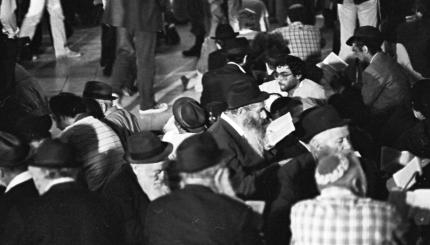Reprinted from The Jewish Religion: A Companion, published by Oxford University Press.
Heresy is the holding of beliefs contrary to the Jewish religion. Any attempt to study the phenomenon of heresy in Judaism has to take note of the differences in this matter between Judaism and the Christianity. The various councils of the Christian dominations met in order to define Christian doctrine, any departure from which was seen as heresy. In Judaism, on the other hand, while there are Jewish dogmas, there has never been any officially accepted formulation of these, no meeting, say, of authoritative rabbis, to decide what it is that Judaism teaches in matters of faith. 
It is no accident that Maimonides, who drew up his 13 principles of the Jewish religion, was the first noted Jewish thinker to attempt a systematic treatment of the various types of heresy. Ironically, Maimonides himself was accused of heresy because of his declaration that anyone who believes that God is corporeal is a heretic! What actually happened in the history of Judaism was that a kind of consensus emerged among the faithful that there are limits in matters of faith, broad to be sure, to step beyond which is heretical.
There are a number of terms corresponding to heretic in the rabbinic sources. There are references to Jews who “deny the root principle,” denoting atheism in its practical sense, that is, the attitude which, while not necessarily denying that God exists, denies that God is concerned with human life and its conduct.

Help us keep Jewish knowledge accessible to millions of people around the world.
Your donation to My Jewish Learning fuels endless journeys of Jewish discovery. With your help, My Jewish Learning can continue to provide nonstop opportunities for learning, connection and growth.
Another widely used term is apikoros, not connected, strangely enough, in the rabbinic literature with the Greek philosopher Epicurus, but understood as referring to people who entertain false beliefs about the Torah and who revile its teachers. But the most frequent term for heretic is min. This word (plural minim) means a “species” and is used to denote a sectarian. For “heresy” the word, coined from min, is minut.
To give one example among many, the Talmud (Berakhot 12b) observes that when Scripture states “do not follow your own hearts (Numbers 15:39)” it refers to heresy (minut) since in another verse it is said: ‘the fool hath said in his heart there is no God (Psalms 14:1).’ The minim mentioned in the rabbinic literature may be the early Christians or the Gnostics but the term minim embraces all sectarians who hold dualistic views contrary to pure Jewish monotheism.
In the post-Talmudic period, among the groups to be declared heretical by the rabbinic upholders of the tradition were the Karaites; some of the rationalistic philosophers; the Shabbeteans, and the Frankists. Some of the kabbalists dubbed opponents of the kabbalah heretics for denying the ‘true science’, while these opponents considered the kabbalah to be heretical because of its belief in the sefirot.
The Mitnagdim regarded the Hasidim as heretics for their belief that all is in God and in the powers of the Zaddik, and the Hasidim the Mitnagdim for denying, among other things, these selfsame powers. Both Hasidim and Mitnagdim often called followers of the Haskalah heretics. Some rabbis denigrated the Zionists as heretics who took matters into their own hands instead of waiting patiently for the Messiah. The early Reformers were seen as heretics by the Orthodox rabbis; the term “Orthodox” itself is adapted from Christian discussions of orthodoxy versus heresy. On the contemporary scene, many of the Orthodox consider Reform, Conservative, and Reconstructionist Jews to be heretics, albeit unintentional ones.
Heretics were treated with opprobrium but were only rarely excommunicated; the herem was reserved largely for practical breaches of communal discipline. On the other hand, Spinoza was excommunicated by the Amsterdam rabbis for his pantheistic beliefs. The statement in the Talmud (Avodah Zarah 26b) that if heretics fall into a pit they need not be rescued and may even be pushed in the pit to die, is obviously hyperbole. There is no instance of it ever having been followed in practice. Even Maimonides, not particularly noted for his religious tolerance, states that this was the law.
Talmud
Pronounced: TALL-mud, Origin: Hebrew, the set of teachings and commentaries on the Torah that form the basis for Jewish law. Comprised of the Mishnah and the Gemara, it contains the opinions of thousands of rabbis from different periods in Jewish history.

Help us keep Jewish knowledge accessible to millions of people around the world.
Your donation to My Jewish Learning fuels endless journeys of Jewish discovery. With your help, My Jewish Learning can continue to provide nonstop opportunities for learning, connection and growth.
Torah
Pronunced: TORE-uh, Origin: Hebrew, the Five Books of Moses.

Help us keep Jewish knowledge accessible to millions of people around the world.
Your donation to My Jewish Learning fuels endless journeys of Jewish discovery. With your help, My Jewish Learning can continue to provide nonstop opportunities for learning, connection and growth.


